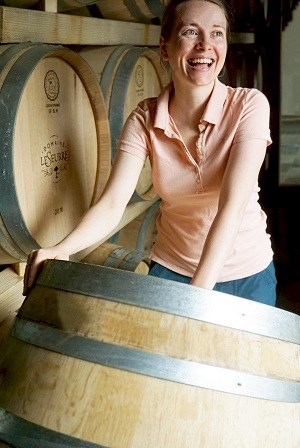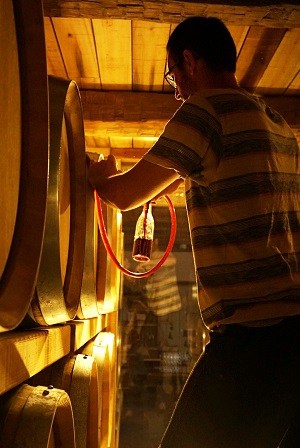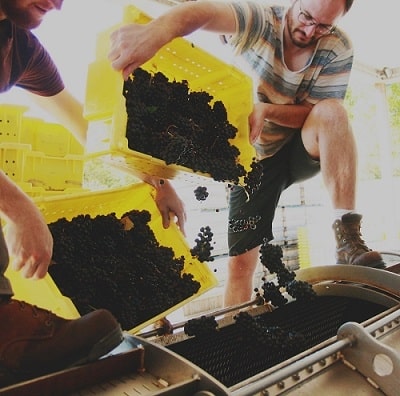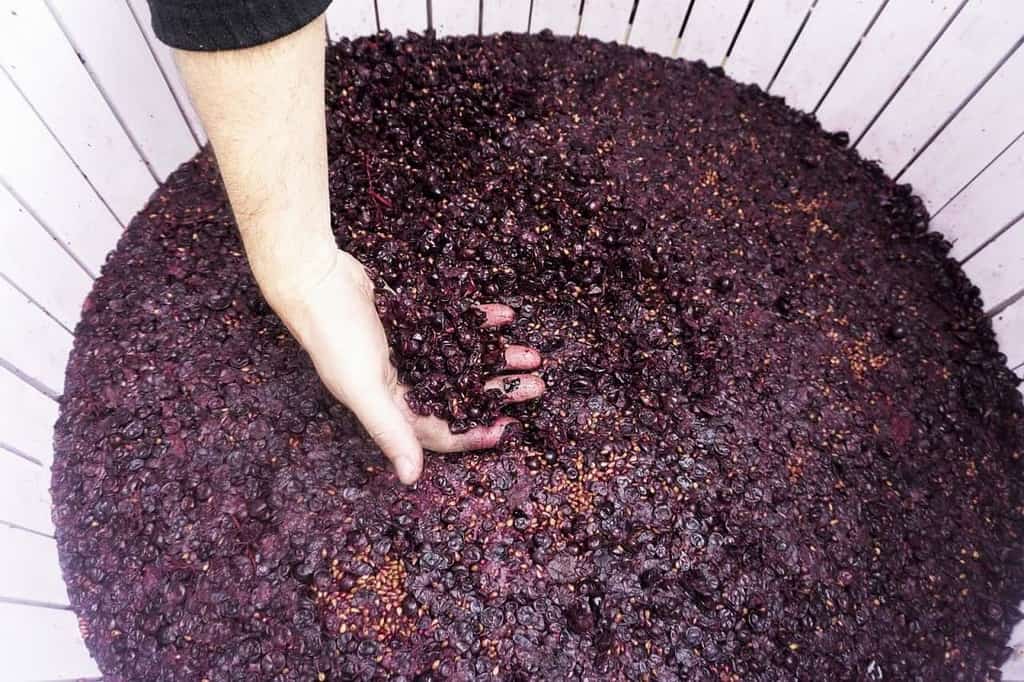“We would much rather skip a vintage than to produce a wine just for the sake of having it available. For example, we have only produced vintages of Pinot Noir in 2012, 2016, and 2017. We did not produce any vintages any other year because the (Pinot) grapes were not up to our quality standards and we didn’t feel it was right.” – Sébastien and Celine LeSeurre (of Domaine LeSeurre)
Domaine LeSeurre – A French-inspired Winery in the Finger Lakes
It’s summer 2019 and I’m catching up with Sébastien and Celine LeSeurre. As a Finger Lakes local, I’ve visited their winery a few times over the years, and it’s because of their attention to detail — like with their Pinot Noir production mentioned above — that I knew it was time to properly share their story.
Every year here in the Finger Lakes, there are more and more wineries and producers. I mention both of them because some are so small that they don’t have a physical tasting room. Others start with a small space and grow over time – both their physical space and with their wine production.
Domaine LeSeurre is one of those wineries. They started with a modest yet proud tasting room – in the Fall of 2013, perched atop a slight hill on the east side of Keuka Lake.

What’s exciting about Domaine LeSeurre is that the owners, Sébastien and Celine, are both originally from France (Champagne and Toulouse, respectively). Sébastien is a 6th generation winemaker with multiple degrees in viticulture and oenology and wine marketing. Celine grew up with family vineyards in South West France and earned degrees in hospitality. Between the two of them, they had worked numerous vintages across France, Australia, New Zealand and the United States, but they chose the Finger Lakes to to raise a family and to start their winery.
So why the Finger Lakes? Since the region seems to be in the middle of nowhere, how the heck did they end up here? Terroir is the answer.
Sébastien and Celine were fortunate to taste fruit from various vineyards across the entire region. It was such an eye-opening experience that they decided they needed to make the Finger Lakes their home, which is exactly how Domaine LeSeurre started in 2013. In addition to what the tasted, they also realized that climate change means the Finger Lakes can still maintain perfect vinifera growing conditions into the future.
Let’s get into some more details from Sébastien and Celine LeSeurre:
Adrian Prieto from Winetraveler (WT): What are some of the ways Domaine LeSeurre is different from other wineries here in the Finger Lakes?
Sébastien and Celine LeSeurre from Domaine LeSeurre (DS): “We do many things by taste and only by taste. It’s only after tasting the grapes that we make decisions about when to pick. Many wineries in the Finger Lakes measure Brix and levels of acidity, where we pick purely based on intuition and taste.”
WT: Do you own your own vineyards or do you source from growers – or both?
DS: “Right now we work with numerous growers. But, we moved here specifically for (the fruit/grapes) from certain vineyards and specific terroir. Some of the Riesling we work with are from vines planted in 1971. We work closely with growers year-round, and there is significant attention to detail.”
WT: What’s your style, if you have one? And if so, how do you describe it?
DS: “We are a mix of Old World and New (World); a mix of technologies and practices, bâtonnage, cooling systems, etc. But we focus on the vineyards and fruit and try our best to represent the truest sense of terroir, from the grape to the bottle.”

As I’m talking to Sébastien, his personal attention to his wines and fruit is distinct. Additionally, their aging program is unique and intentional. For red wine, two years in the barrel and one year in the bottle are required, minimum. For white wine, it’s one year on the lees and one year in the bottle. Sparkling wine? Seven years. This tells me that the focus of their wine is quality. Yes, for them, it takes an investment — time and money — to produce a superior product. It’s attention to the details like this that excite me!
With all wines though, there is an extensive process of tasting to determine the exact time in barrels and tanks and what additional steps, if any, are needed. Uniquely and of note, some of their Riesling is partially fermented in oak. This is more common in the some parts of the Old World, mainly France, and a handful of other Finger Lakes producers have some Riesling production with similar methods.
WT: Some of your Riesling is produced partially in oak. Why?
DS: “We are aging our Riesling barrel select 100% in French oak to achieve a beautiful complexity, texture and length which is brought about by contact with the lees and the bâtonnage process (the stirring of the lees). Additionally, when aging in oak barrels, an average of 10% of the wine is lost per year. This is known as the “angel’s share,” and even though we have lost a small portion of this beautiful wine, this process leads to a concentration of what is left. Finally, the oak aging allows for micro-oxygenation, which is a controlled, slow exposure to oxygen during resting. The micro-oxygenation process affects the color, aromatic bouquet as well as the mouth feel of a wine and leads to more layers of complexity. This wine is a perfect food pairing wine.”
As the earth warms with climate change, the processes for winemaking are innately changed significantly. The process hinges directly on the climate and the weather in very specific regions. Here in the Finger Lakes, there is already extensive vintage variation – as discussed with the Pinot Noir at the beginning of this piece. But, what does “vintage variation” actually mean for winemakers and grape growers and how do they combat it?
For Domaine LeSeurre, they taste grapes throughout the growing season every two days. This provides immediate insight into sugar and acidity and gives them an intuition about exactly when to pick. They have spent numerous vintages in both the Northern and Southern hemispheres, which has given them specific insights into how different producers combat climate change and vintage variation.

For example, in New Zealand, the growers they worked with relied on the lunar calendar. Both grape maturity and sugar content are linked to the lunar cycles. At the end of the day though, it’s their job to guide the grapes. In a way, to let nature take its own path yet provide intentionality in the wines they want to make.
Farming, grape growing, and winemaking have been a part of the history of the Finger Lakes for hundreds of years. So when a new winery joins the many producers in the area, it raises some eyebrows when they’ve moved here from France.
A few more questions with the LeSeurre’s:
WT: How do you think Domaine LeSeurre fits into the Finger Lakes region and wine community? What’s your role, so to speak?
DS: “Our role is to bring generations of winemaking experience from the Champagne region in France. We bring the knowledge we have gained from the lessons we have learned as we traveled and worked in various wine regions around the world. And we bring a fresh spirit, new techniques and a new approach to a region with enormous potential, with which we have fallen in love. The Finger Lakes has a friendly wine community that is eager to continue learning and evolving.”
WT: Why do you think wine lovers/wine tourists should visit you?
DS: “They should visit us if they love artisan wines from a small, family-run winery that produces its wines with passion. Whatever wines they love, we will be happy to meet their expectations! They should also come if they want to find a little bit of France in the Finger Lakes, or at least a French accent for sure! If they hold space in their hearts for wine regions such as Burgundy, Champagne, Bordeaux, the Loire, etc., they will find similarity in the style and energy here, applied to Finger Lakes grapes and wines. If they want a good time, good wine, good food and a good view, then this is the place to find it. Guaranteed!”
WT: What excites you? What are you most proud of?
DS: “We are most proud of our two beautiful daughters. They are our little ‘winemakers in training’ and they are already in love with grapes, vineyards and wine. We love helping them cultivate this passion for viticulture and winemaking, as we developed this same passion when we were their age. We grew up among the vineyards, watching our family practice the art of creating beautiful wines. We are also deeply excited by the youthful, collective energy of everyone involved in this Finger Lakes wine region. Every day the region as a whole is learning, improving and growing. It is a pleasure to watch and we are proud to be a part of this unique and exciting community.”
As I’m ending my time with Sébastien and Celine, it feels more and more like I’m in France. But then it hits me – they chose to move here intentionally. It’s with this intentionality that they also make their wines: with passion and dedication, learned over generations of winemaking in the Old World and honed throughout the world.
Sébastien may have said it best: “We have a terroir focus. We have studied our craft in New Zealand, Australia, the United States, as well as France. We use both new and old-world techniques and apply them to Finger Lakes terroirs. We may be French winemakers, but here, we make Finger Lakes wines.”
More Ways To Explore & Learn About The Finger Lakes
Old World Wine in the Finger Lakes: A Journey through France, Here in the Finger Lakes
Barnstormer Winery – A Unique Approach To Winemaking in the Finger Lakes
5 Amazing Seneca Lake Wineries To Visit If You Love Dry Red Wine
3 Historic Wineries To Visit on Keuka Lake
How To Explore the Finger Lakes Wine Region According to a Master Sommelier
9 Outstanding Wineries in the Finger Lakes if You Love Sparkling Wine
10 Exciting Finger Lakes Outdoor Activities To Experience
